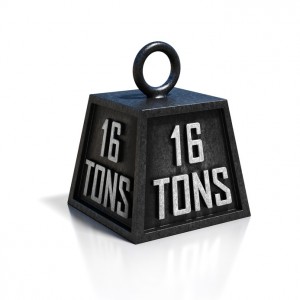**This post will help you with Phase 1 of your Freelance Workbook.**
We underestimate the impact employers have on our lives…and that’s an understatement.
I fell asleep last night thinking of all the ways my life has been different since becoming a full-time freelancer but also wondering what my life would be like if I’d never been conditioned to engage with employers in the first place, let alone worked under one for 15 years — it was a sobering exercise in understanding exactly how much of a hand employers have in shaping and controlling individual lives.
What struck me most, is how quickly most of this power would be rejected if it were as overtly wielded by the government or Church…and yet here we are, with most of us still, at some level, having sold our souls to the company store.
Here’s a loose list of what I’ve noticed just in my few years of freelancing and listening to other freelancers. They aren’t true for every employer or employee (I know…#NotAllEmployers), but they are in no way uncommon. I’m sure the list is MUCH longer, so feel free to leave your own ideas in the comments.
- Sleep schedules
- Our relationship to certain days of the week (hating Mondays living for Fridays, SundayFunday, etc.)
- What we study in college
- Where we go to college (in turn, who are friends are, who we partner with)
- What we study in high school
- Our access to healthcare (in the U.S. in the form of insurance choices)
- Our perception of the cost of healthcare (as filtered through their insurance partners)
- What we consider a vacation
- How we watch TV
- How TV is scheduled
- How we engage in our hobbies
- Where we live (locally and regionally)
- How we borrow
- How we define stress
- How we recognize stress
- Where we send our children to school
- How we dress
- How we wear our hair (My sister in law wants teal streaks in her hair, but won’t because of job issues…Going natural has been much easier for me as a freelancer.)
- How much we spend on clothes
- How we eat (working lunches)
- When we eat
- Our relationship with food
- What vehicles we drive
- Whether we drive at all
- Physical wear and tear (ergonomics and whatnot)
- How often we drive
- How often we expose ourselves to travel risks (auto accidents, business travel, encounters with law enforcement)
- Who we compare ourselves and our lives to
- How we express our political views
- Political engagement (inconvenient/inaccessible voting, penalties for time taken to protest in the form having to take PTO and threat of lost health coverage, reduced time available for political education)
I’ve come to see employment as a reality of survival in much of this world. What actually makes me sad is the idea of Black people and our uniquely painful relationship with labor, aspiring to employment relationships that only barely work for the best-case-scenario of White people. I understand that there are real rewards for that aspiration (I have two, highly career-oriented degrees) but I increasingly believe that the returns on those hopes and efforts are diminishing, but also diminishing fast.
Megan

Work controls our lives; money controls the work; the federal reserve controls the money; private foreign banks and select (elite) individuals control the federal reserve.
I guess we really never left the plantation.
Wow, I just found this site and that list hit me heavy. I began freelancing out of college because I couldn’t find a full time position and it’s kind of just snowballed. I felt less than my peers for a while but as I learn more about the working world, I feel more confident in my decision. I’m not saying I won’t go corporate, but if I do it won’t be out of desperation now.
Hi!
Whether you go corporate or not, you’re lightyears ahead of your peers. All of us need to know how to work for both ourselves, and employers. That’s just where the world of work is headed.
I also think that eventually, freelancing will be seen as having status, but that might be a ways off.
“I’ve come to see employment as a reality of survival in much of this world. What actually makes me sad is the idea of Black people and our uniquely painful relationship with labor, aspiring to employment relationships that only barely work for the best-case-scenario of White people. I understand that there are real rewards for that aspiration but I increasingly believe that the returns on those hopes and efforts are diminishing, but also diminishing fast.”
This paragraph says it all, and it kind of explains why I went freelance. I am very ambitious and I aspire to do well in my career, but I felt as though I wasn’t getting a return on my hard work and efforts in my previous job as a content writer for a content marketing agency in the UK. Worst of all, I felt as though I was a slave to my boss who treated me like absolute dirt.
Chichi
chichi-writes.blogspot.co.uk
Definitely…it’s SO easy to hit that wall where the returns on your labor just diminish into nothing.